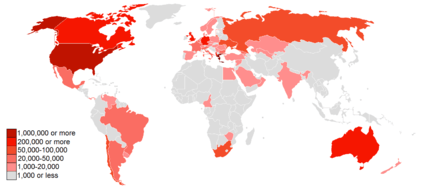Greeks in Germany
| Total population | |
|---|---|
| 394,000 (2014.)[1] | |
| Regions with significant populations | |
| Frankfurt Rhine Main Region, Munich, Stuttgart Metropolitan Region | |
| Languages | |
| German, Greek | |
| Religion | |
| Predominantly Greek Orthodox Church |
The Greeks in Germany form a significant community with a population of roughly 400,000 people according to the Federal Statistical Office of Germany, on December 31, 2014.[2]
History
The first Greeks came during the time of the Roman Empire to Central Europe.
Significant immigration from Greece to Germany started around 1700, when the Ottoman Empire opened its borders. The first community was found in Leipzig at this time.
The second wave of immigration was when Otto of Wittelbach became King of Greece as Otto of Greece. Many Greeks came as students to Bavaria.

The Greek population of today came mostly after World War II. West Germany needed employees for their expanding industry. In East Germany, Greek communists came as political refugees until 1973.
Many Greeks were relocated to German Democratic Republic during the Greek Civil War.
Education
The first Greek schools were created because of the amount of Greeks immigrating over to Germany. Since the first Greek school built in 1960 and up until 1990, over 1 million Greeks had immigrated to Germany. About 800,000 of those Greeks had after either a long-term or a short term stay had gone back to Greece. Nowadays, every fifth of an estimated 47,000 students of Greek origin attends one of 35 Greek schools in Germany.
The Greek are a successful minority. Second-generation Greek students were more likely to attend a Gymnasium (college preparatory school) than their ethnic German counterparts.[3]
Demographics
The population of the Greek community in Germany was estimated by the Federal Statistical Office of Germany to be 294,891 people on December 31, 2007.[1] The number increases significantly in other estimations, as the Federal Foreign Office of Germany gives an estimated population of 320,000 people,[4] while the Ministry of Foreign Affairs of Greece steps it up to 380,000.[5]
| Year | 1967 | 1970 | 1973 | 1976 | 1979 | 1982 | 1985 | |
|---|---|---|---|---|---|---|---|---|
| Persons | 200,961 | 342,891 | 407,614 | 353,733 | 296,803 | 300,824 | 280,614 | |
| Year | 1988 | 1991 | 1994 | 1997 | 2000 | 2001 | 2003 | |
| Persons | 274,973 | 336,893 | 355,583 | 363,202 | 365,438 | 390,843 | 486,543 | |
Greek Muslims
There are some members of the Muslim minority of Greece among the some 350,000 Greeks living in Germany who are ethnic Turks or who espouse a Turkish identity.[6] The majority of Turks immigrated from Western Thrace.[7] In the 1960s and 1970s, the Thracian tobacco industry was affected by a severe crisis and many tobacco growers lost their income. This resulted in many Muslims leaving their homes and immigrating to Germany with estimates suggesting that today there are now between 12,000[8] and 25,000[9] residing in Germany.
Notable people

- Theophanø (960-991) - Wife of Otto II, Holy Roman Emperor.
- John Argyris (1913-2004) - was among the creators of the Finite Element Method (FEM)
- Daniela Amavia - actress and model
- Adam Bousdoukos- from Soul Kitchen
- Constantin Caratheodory - mathematician
- Miltiades Caridis - conductor
- Costa Cordalis - singer/songwriter
- Giorgos Donis - footballer
- Margaritis Dimitsas (1830-1903) - geographer
- Artemis Gounaki - singer/songwriter
- LaFee - singer/songwriter
- Georg Anton Jasmatzi (1847-1922) - founder of the Jasmatzi tabac factory (later sold to British American Tobacco)
- Aris Kalaizis - painter
- Panajotis Kondylis (1943-1998) - philosopher
- Jonas Kyratzes - video game designer
- Vicky Léandros - singer
- Pierre Mavrogordatos (1870-1948) - archaeologist
- Ioannis Masmanidis - footballer
- Kostantinos Mitroglou - footballer
- Argyris Nastópoulos - singer
- Demis Nikolaidis - footballer
- Antonis Remos - singer
- Susan Sideropoulos- singer and actress
- Despina Vandi - singer
- Anastasia Zampounidis - broadcaster
- Linda Zervakis - newscaster (Tagesschau)
- Xaris & Panos Katsimihas - singers, songwriters, composers
See also
References
- 1 2 "Foreign Population" (PDF). Federal Statistical Office of Germany. Retrieved 2009-01-18.
- ↑ Migrationsbericht 2014
- ↑ Panagiotis Kouparanis: Migrantenkinder mit Bildungserfolg retrieved 20 January 2008
- ↑ "Greece". Federal Foreign Office of Germany. Retrieved 2009-01-18.
- ↑ "Germany". Ministry of Foreign Affairs of Greece. Retrieved 2009-01-18.
- ↑ Westerlund & Svanberg 1999, 320-321.
- ↑ Council of Europe: Parliamentary Assembly 2007, 118.
- ↑ Clogg 2002, 84.
- ↑ International Assembly of Western Thrace Turks. "POLITICAL AND CIVIL ORGANISATION COMMISSION". Retrieved 2010-05-19.
Bibliography
- Clogg, Richard (2002). Minorities in Greece: Aspects of a Plural Society. C. Hurst & Co. Publishers. ISBN 1-85065-705-X..
- Council of Europe: Parliamentary Assembly (2007). Parliamentary Assembly: Working Papers 2007 Ordinary Session 22–26 January 2007. Council of Europe. ISBN 92-871-6191-7..
- Westerlund, David; Svanberg, Ingvar (1999). Islam Outside the Arab World. Palgrave Macmillan. ISBN 0-312-22691-8..
Further reading
- Troebst, Stefan (September 2004). "Evacuation to a cold country: child refugees from the Greek Civil War in the German Democratic Republic, 1949-1989". Nationalities Papers. 32 (3): 675–691. doi:10.1080/0090599042000246442.
